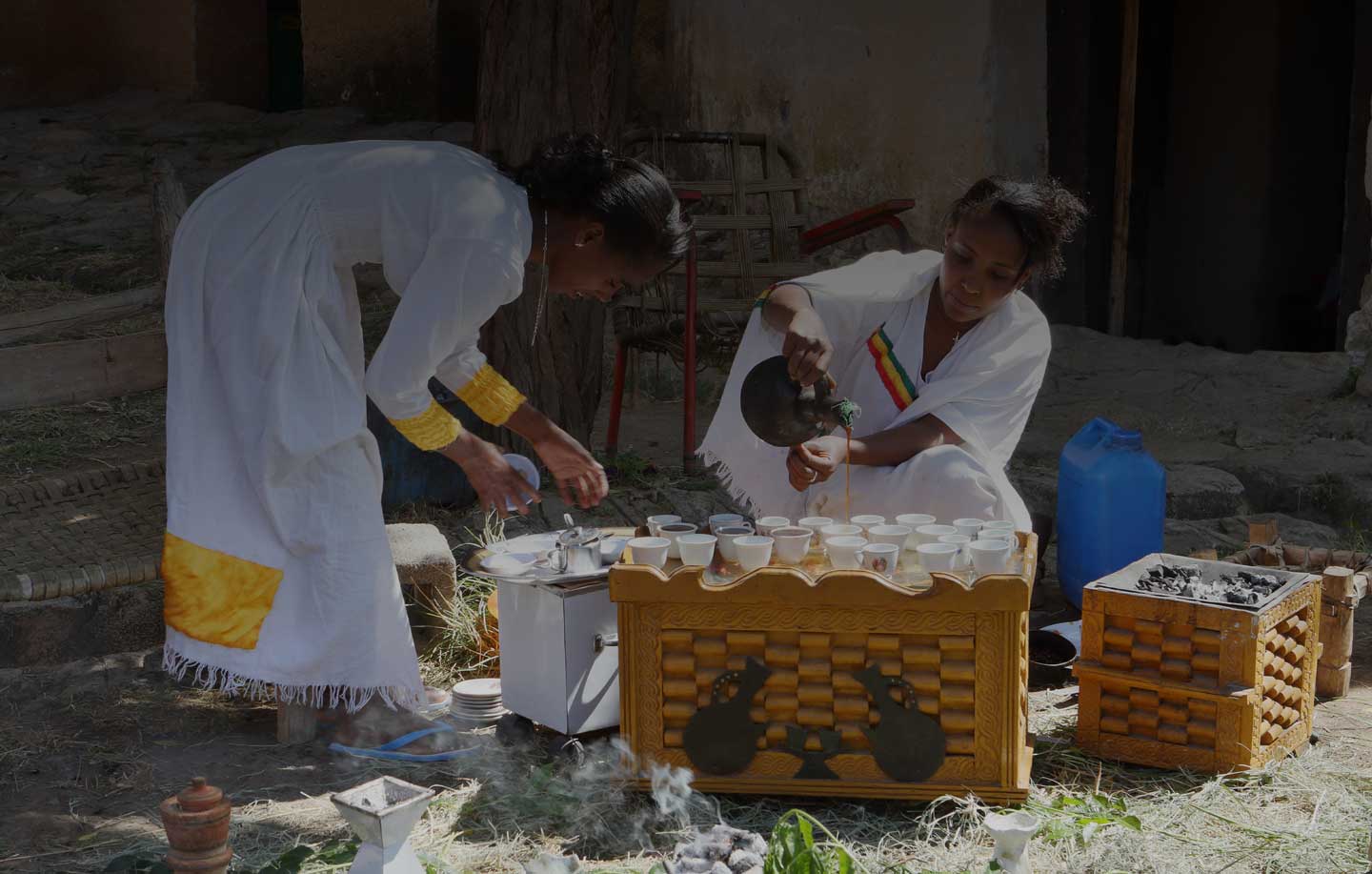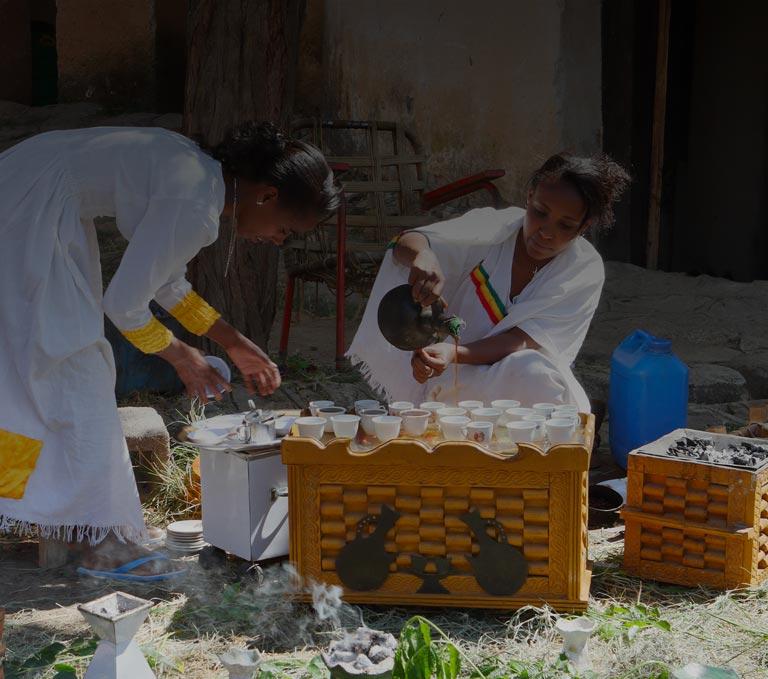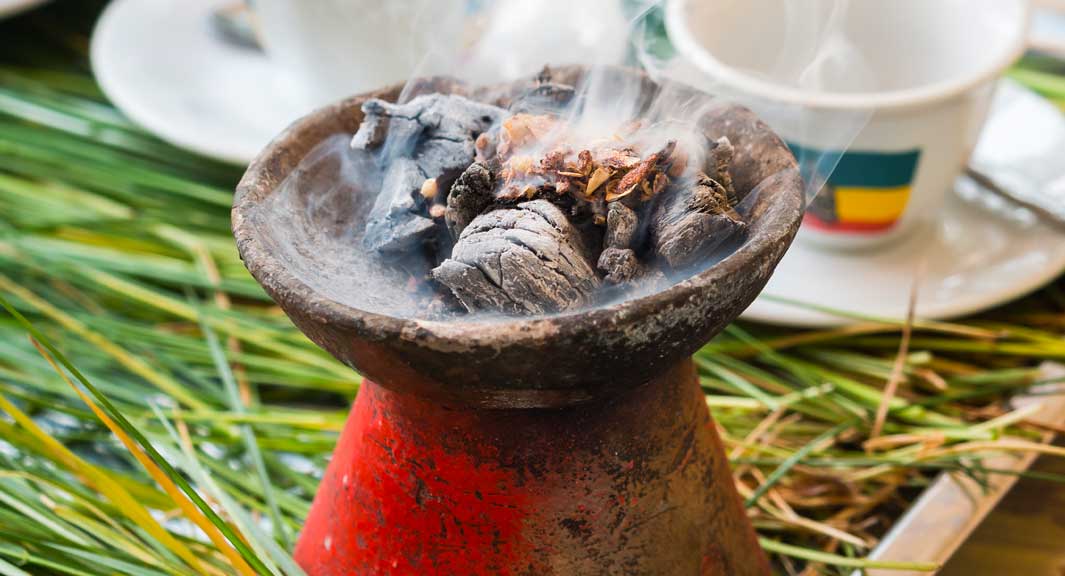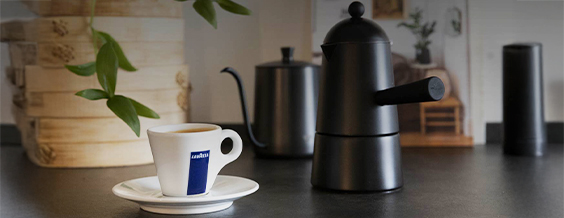*Lavazza is not affiliated with, endorsed or sponsored by Nespresso


The ceremony of coffee in Eritrea and Ethiopia
Coffee brewing is at the heart of Ethiopian and Eritrean traditional culture. Coffee is offered while receiving friends, neighbours and visitors, such as festivals and weddings. Whether coffee is kindly refused, it is tea – shai in the local language – to be most likely served. This ceremony is far from just a coffee break, it is a sign of respect to elders and represents a spiritual time dedicated to the blessings of life.
The ceremony in Eritrea
The Eritrean coffee ceremony is a ritual that requires time, whilst sitting down with family and friends to converse, since according to this culture time and loved ones are considered as central elements.
Regarding the quality of the coffee, preferences vary from region to region: in some it is Sidamo to be chosen, thanks to its well-rounded and delicious yet complex flavour, with its floral, citrusy aroma and delicate notes of berry and cane sugar, while elsewhere Harar, an exotic, bold smoky and complex variety including tones of cinnamon, cardamom, blackberry and apricots, is preferred. The methods of roasting and brewing are deeply rooted in the families’ traditions.
It is fairly common in Ethiopia to roast the beans over a charcoal brazier. As it all begins, it is fundamental for many communities to enjoy the sweet and woody scent of Frankincense or Myrrh incense.
Each stage of the brewing is carried out by women in front of the guests, who can view how they roast the beans using a small and shallow pan with a very long handle named menkeskesha. The process stops when the oil begins to show on the beans. They are immediately poured on a round woven mat, so that they can cool down. While the process takes place, all those involved can smell the smoky roasted beans, with their hot and intriguing aroma.
According to the tradition, coffee is then pound with a mortar and pestle until it reaches a medium-fine consistency. Next, it is brewed using a Jebena, a typical small and narrow round-bottomed black clay coffee pot . While waiting for the coffee to heat up, guests can nibble on some crunchy and slightly sweet Dabo Kolo, a local type of bread essentially made of flour, sugar, and water which is cut down into small pieces and then fried or baked. Thereafter, the pot is placed on a special woven holder, since it has a round bottom and cannot sit on a flat surface by itself.
A few minutes the coffee pot will need to cool and let the grounds settle to the bottom, before filling the Finjal, small Eritrean cups made in porcelain. A filter made from horsehair is used to avoid the grounds from escaping. Time to savour a smooth, delicious coffee, which is not bitter, nor sour or too strong.

The ceremony in Ethiopia
Known as Habesha Coffee Ceremony, the Ethiopian Cultural Coffee Ceremony recalls to the longstanding tradition of growing and preparing the beverage in Ethiopia. The so-called Buna, a coffee-making ritual involving roasting, grinding and brewing beans while taking part in a community-oriented tradition, is practiced all over Ethiopia.
Nevertheless, Ethiopia is where the Arabica quality is originally from. Although coffee is currently grown all over the world, the country of the Horn of Africa is still the largest producer in Africa and the fifth worldwide. Ethiopian traditional coffee is served very strong, and it is commonly – as well as in Eritrea – accompanied by burning incense. Let’s see how day after day Ethiopians turn their dried coffee beans into a persistent and flavourful brew.
The traditional Ethiopian coffee ceremony is in fact extended and involves a long processing turning the raw and unwashed coffee beans into finished cups of coffee.
It begins with the preparation of the room where the ritual is going to take place. The women who are about to perform the ceremony are likely to spread fresh and aromatic grasses and flowers across the floor, right after lighting some incense to ward off evil spirits. At this point, the Jebena is filled with water and placed over hot coals.
A handful of green coffee beans are carefully cleaned by using the menkeskesha. After doing so, they are slowly roasted in the same pan. Women tend to keep the roast as even as possible by shaking the beans or by constantly stirring them. Once the beans are blackened and shimmering with essential oils and their aroma is intense and alluring, they will be grinded by using a tool resembling a mortar called mukecha or a pestle known as zenezena, until the coffee becomes a coarse ground. As soon as the beans are ground, they are put into the water in the Jebena and the mixture is brought to a boil.
When the coffee is ready, and the ceremony performer pours it in a single stream from a foot above the cups, filling each cup. The youngest child is often asked to serve the oldest guest the first cup of coffee. Then, it is the performer who serves all the other guests. After sugar is added, guests bunna tetu – “drink coffee” – just before praising the hostess and the beverage she prepared for them.
After the first round, two additional servings generally follow. These three increasingly weaker servings are known as abol, tona, and baraka. While the first cup is supposed to transform the spirit, the third and final one is considered as a blessing to those who are drinking.
While commonplace across Ethiopia, the preparation may encounter some variations, including the adding of cardamom, cinnamon and cloves to the blend, popcorn can often accompany the coffee.
What is celebrated with the ceremony
Since the origin of coffee is to be found in this part of the world, it is no surprise that it is a cornerstone of Eritrean and Ethiopian culture. Coffee Ceremonies are a traditional occurrence for the communities of both countries and are to be seen as rituals which are typically held at the leisure of the host, in the company of family and close friends.
In some parts of Ethiopia, the ceremony may take place up to three times day, once in the morning, once in the afternoon and in the evening. The performance can be seen as a way to welcome visitors into the host’s house in times of celebration.
The coffee ceremony is undoubtedly considered as the most important social occasion in many villages, as it represents a sign of respect and friendship to those who are invited. In fact, guests may discuss several topics, such as politics and community matters.
Apart from fostering pure socialisation, the coffee ceremony also holds a spiritual role in Ethiopia, as it highlights the importance of Ethiopian coffee and coffee culture.




















